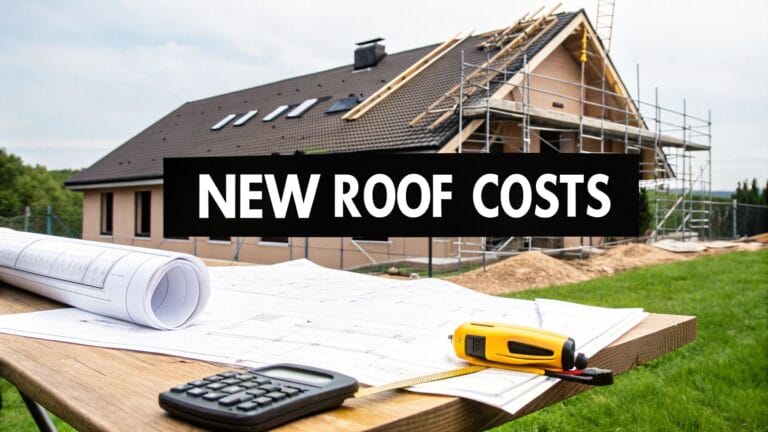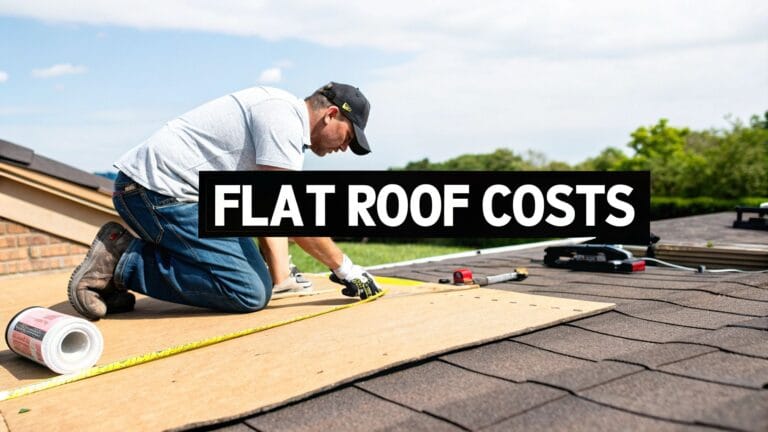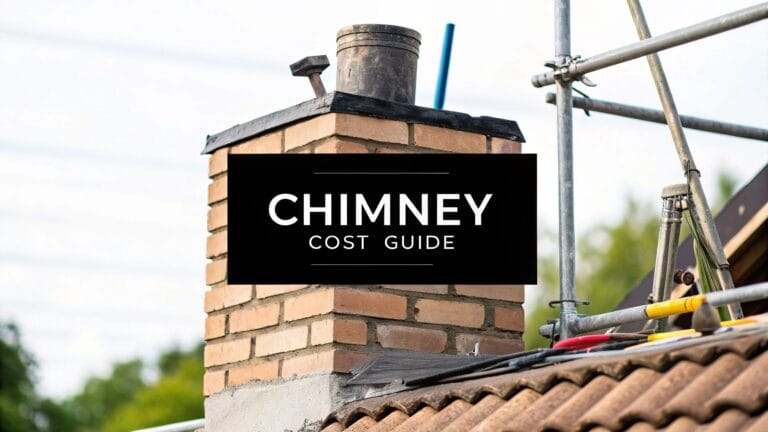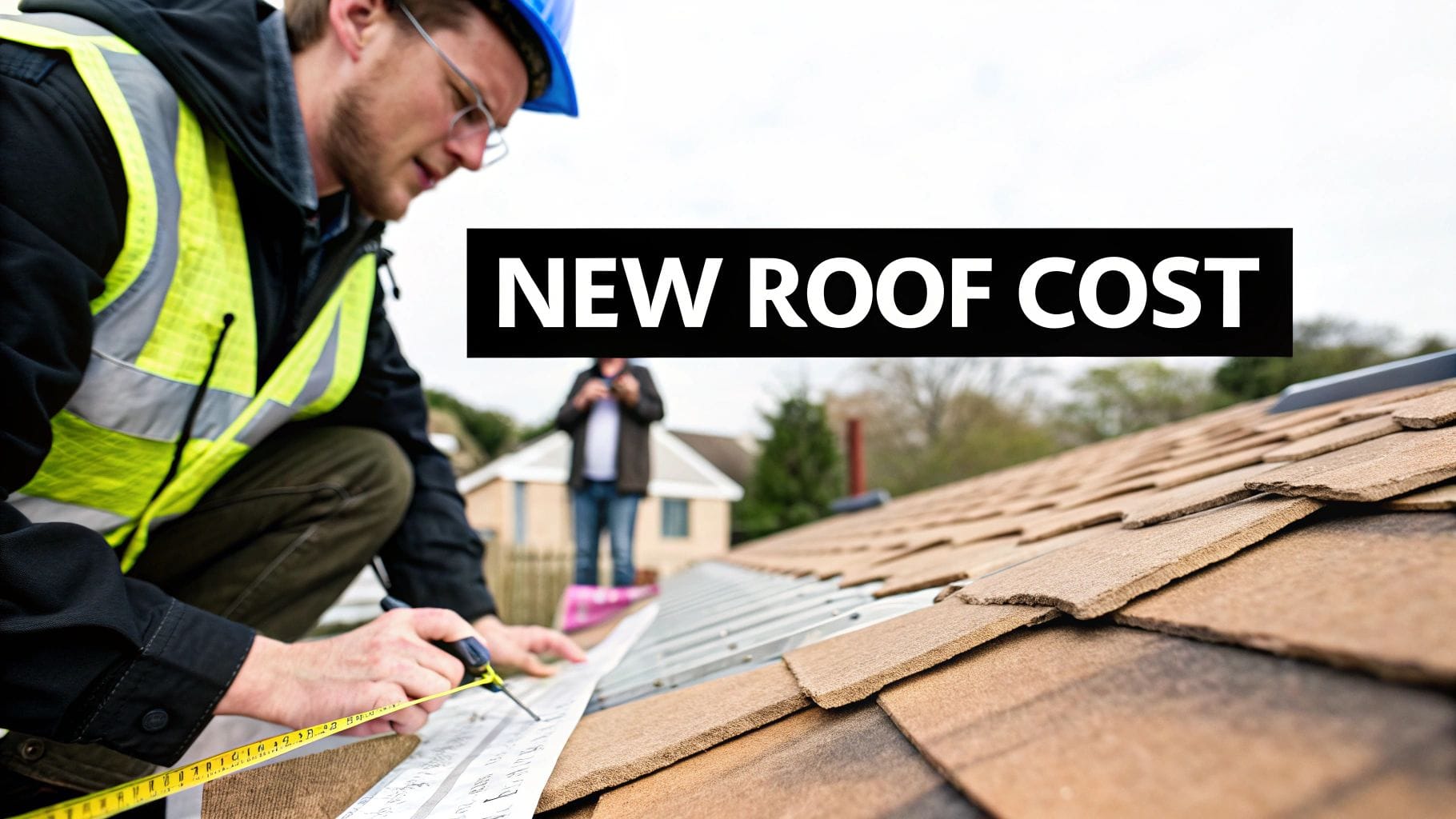
What’s the Average Price for a New Roof in the UK? A Practical Guide
Discover the average price for a new roof in the UK. Learn about costs by materials and location to plan your roof replacement effectively.
Trying to pin down the average price for a new roof in the UK can feel like guesswork, but it doesn't have to be. Let's get straight to it: for a typical 3-bedroom semi-detached house, you’re generally looking at a cost somewhere between £5,000 and £7,500. Most projects of this size wrap up within two to four days.
Getting a Feel for the Initial Cost
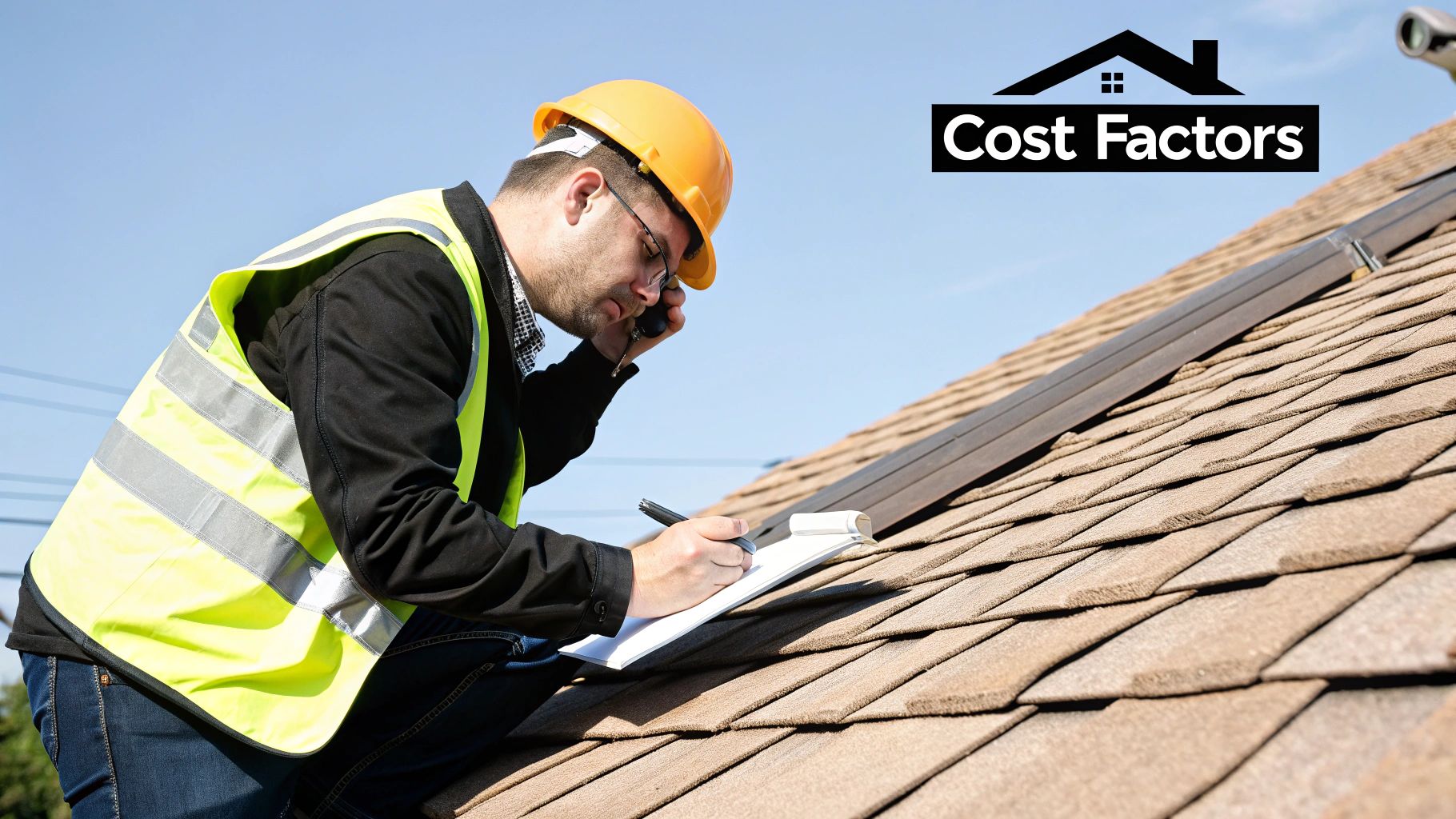
When you first dip your toes into researching new roof costs, the numbers can seem all over the place. That’s because no two roofing jobs are ever truly the same.
It’s a bit like buying a car; the sticker price is just the beginning. The make, model, and any optional extras you add will all shape the final cost. Your roof is no different. The initial estimates you see are a great starting point, giving you a ballpark figure to work with before you get into the finer details.
To help you get a clearer idea, here's a look at some typical price ranges for different property types across the UK.
Estimated New Roof Cost in the UK by Property Type
This table gives you a quick look at estimated costs for replacing a roof on different types of UK properties, providing a baseline for your budget.
| Property Type | Typical Price Range (£) |
|---|---|
| Terraced House (Mid) | £4,500 – £6,500 |
| Semi-Detached House | £5,000 – £7,500 |
| Detached House (4-Bed) | £7,500 – £12,500 |
| Detached Bungalow | £4,500 – £7,000 |
It's really important to see these figures as a guide. Your final investment will be unique to your home, influenced by its size, the complexity of the design, and the specific materials you choose for the job.
Nationally, the data points to a typical cost of around £6,000 for a new roof, which usually aligns with a standard 3-bedroom semi-detached home. This figure is a solid reference point, but remember it’s shaped by the roof's dimensions, style, and the quality of the materials used.
At Evershield Roofing, we pride ourselves on helping homeowners across Buckinghamshire make sense of every line in their quote. We provide clear, itemised quotes so you understand exactly what you're paying for.
Deconstructing Your Roofing Quote: Key Cost Factors
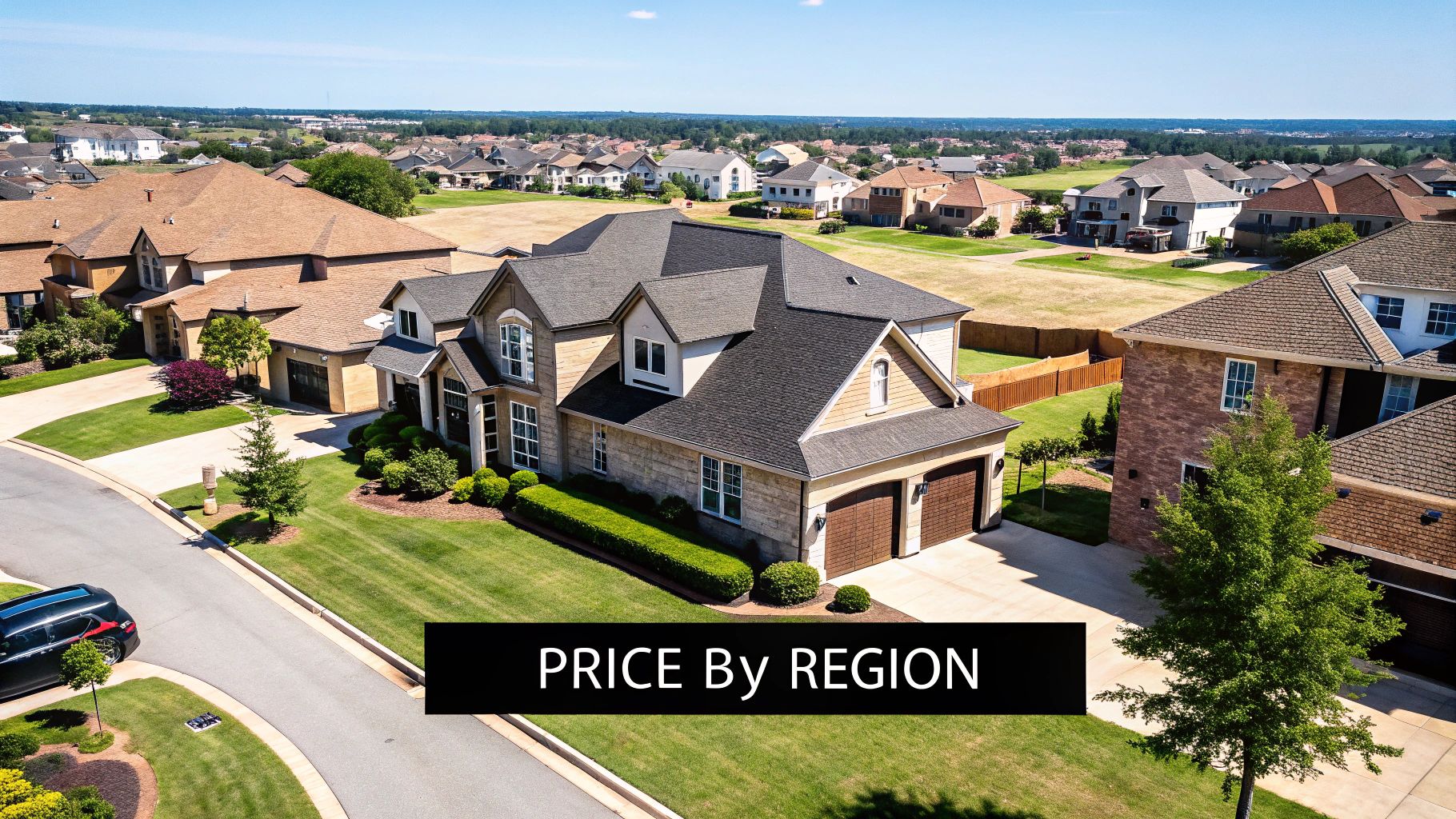
When you start getting quotes for a new roof, it can be a bit of a shock to see prices that vary by thousands of pounds. Rest assured, professional roofers aren't just plucking numbers out of thin air. The difference in the average price for a new roof boils down to three core components, and any good quote will break these down for you.
Think of it like getting a bespoke suit made. The final price is a blend of the fabric quality, the tailor's skill, and the complexity of the design. A simple, off-the-rack suit will always be cheaper than a custom-fitted one made from premium material with intricate stitching. Your roof is exactly the same.
"A roofing quote is a story about your specific project. Every detail, from the choice of slate to the number of valleys, adds a chapter—and a cost. Understanding these elements is the first step towards a confident investment in your property."
Let's pull back the curtain on the three pillars that shape your final quote. Knowing what they are helps you see exactly where your money is going.
The Fabric of Your Roof: Material Costs
By far the biggest variable in any roofing quote is the material you choose to cover it with. This is the "fabric" of your roof, and it doesn't just determine the initial supply cost. It also dictates the final look, how long it will last, and even the specific skills needed to install it properly.
Natural slate, for example, sits at the premium end of the scale. It's undeniably beautiful and can last for over a century, but that quality comes with a higher price tag. On the other hand, concrete tiles strike a fantastic balance between durability and affordability, which is why they're such a popular choice for homes all over the UK.
Here’s a quick look at how materials influence the total cost:
- Supply Cost: This is the straightforward price for the tiles or slates, usually calculated per square metre.
- Installation Skill: Some materials, particularly natural slate, demand a specialist's touch and specific tools, which can increase labour time and, therefore, the cost.
- Associated Components: Every new roof also needs underlay, battens, fixings, and proper ventilation. The quality and type of these essential extras will also factor into the price.
The Tailor's Skill: Labour and Expertise
Just as you'd want a master tailor for that perfect suit, the skill of your roofing team is what makes the difference between a roof that just looks good and one that is secure and long-lasting. Labour costs aren't just about paying for someone's time on site; you're paying for their experience, safety standards, and efficiency.
A quote from a reputable firm like Evershield Roofing will always account for a fully trained and insured team. Labour costs typically cover:
- Removing the Old Roof: This involves carefully stripping back the old materials and, crucially, inspecting the timber structure underneath for any signs of rot or damage.
- Installation Time: This is the time it takes to professionally lay the new materials, which changes depending on the material type and the roof's complexity.
- Scaffolding and Safety: Putting up secure scaffolding isn't just a good idea—it's a legal requirement. It’s a significant part of the cost that keeps the workers and your property safe.
- Waste Disposal: The cost of hiring a skip and getting rid of all the old roofing materials responsibly is another essential part of the job.
The Complexity of the Design: Size and Features
Finally, the unique shape and features of your roof play a huge role in the final price. It’s simple, really: a basic, rectangular roof on a bungalow will always be cheaper to replace than a complex roof on a multi-storey house with lots of angles and features.
These are the key structural elements that add complexity and cost:
- Roof Size and Pitch: A bigger roof naturally needs more materials and more labour. A steeper pitch can also make the job trickier, requiring extra time and safety precautions.
- Features: Things like dormer windows, valleys, hips, and chimneys all require detailed, time-consuming work to make sure they are perfectly sealed and weatherproof.
- Accessibility: If your home is difficult to get to, it can add to the time and cost of getting scaffolding and materials onto the site.
While you might see national averages thrown around, the final cost is always specific to your home. For instance, some data suggests a typical UK roof replacement could be around £7,000, but this figure covers a huge range of property styles and materials. The shape of the roof is a key factor; a complex hipped roof might cost £140 to £284 per m², whereas a standard flat roof is often more economical at £45 to £120 per m². You can find more details about these cost variations and what they mean for UK homeowners by reviewing further roofing cost insights.
Choosing Your Material: From Affordable Tiles to Premium Slate
The material you choose for your roof is easily one of the biggest decisions you'll make. It has a massive impact on the look of your home and, of course, the average price for a new roof. Think of it like choosing an engine for a car—it dictates performance, how long it will last, and a huge chunk of the upfront cost.
Let’s get into the most common options we see here in the UK. I want to look beyond just the price tag and dig into the long-term value you're getting. This way, you can find the perfect match for your home's style, your budget, and how long you want it to last.
Concrete Tiles: The All-Round Performer
For a huge number of homeowners in the UK, concrete tiles are the go-to, and for good reason. They really hit that sweet spot, giving you a durable, attractive finish without the hefty price tag you’d see with something like natural slate. A big plus is their versatility; they can be made to look like more expensive materials, giving you that high-end aesthetic without draining your budget.
While they won’t last for generations like slate, a professionally fitted concrete tile roof will comfortably protect your home for 30 to 50 years. It’s a solid, reliable investment.
Clay Tiles: A Touch of Timeless Tradition
Clay tiles give a property that classic, warm feel that's incredibly difficult to replicate. You’ll often spot them on period homes or properties going for a traditional look, where their rich terracotta colour and distinct shape add some serious kerb appeal. They’re also known for their incredible durability and for holding their colour, resisting the fading that can affect other materials over time.
Of course, that traditional charm comes at a higher price than concrete. Clay tiles are also more brittle, so they need a careful hand during installation, which can nudge the labour costs up. For many people, though, the stunning look and a lifespan of over 60 years easily justify the extra spend.
Natural Slate: The Premium Lifetime Investment
When you’re talking about pure longevity and timeless style, natural slate is in a league of its own. It's quarried directly from the earth, so every single tile is unique. This gives a roof a sophisticated character that manufactured materials just can't touch. A slate roof isn't just a purchase; it's a true long-term investment in your property.
A properly maintained slate roof can last for over 100 years, often outliving the people who installed it. This makes it the most durable and sustainable option out there, but it also comes with the highest initial cost. Fitting slate is a specialised craft, and you need a roofer who really knows what they’re doing, which is reflected in the labour cost. At Evershield Roofing, our team has the specialist expertise required for slate installation, ensuring a perfect finish.
To make an informed choice, it's helpful to see how these materials compare side-by-side. The following table breaks down the key differences in cost, lifespan, and what makes each one stand out.
Comparing Popular UK Roofing Materials
| Material | Average Cost per m² (£) | Estimated Lifespan (Years) | Primary Advantage |
|---|---|---|---|
| Concrete Tiles | £40 – £60 | 30 – 50 | Cost-effective and versatile |
| Clay Tiles | £60 – £100 | 60+ | Traditional aesthetic and colourfast |
| Natural Slate | £80 – £150 | 100+ | Unmatched durability and timeless look |
As you can see, the initial outlay varies significantly, but so does the long-term performance. Your decision ultimately depends on balancing your budget with your desire for a particular look and how long you need your roof to last.

Modern Flat Roofing Systems
Not every home has a pitched roof, and thankfully, modern flat roofing materials have come a long, long way. Today's options, like EPDM rubber (short for ethylene propylene diene terpolymer) and GRP (Glass Reinforced Plastic) fibreglass, provide seamless and completely watertight surfaces. They're perfect for extensions, garages, and modern homes.
These systems are built to withstand UV rays and harsh weather, with lifespans that can reach up to 50 years when installed correctly. Deciding between a flat or pitched roof is a major architectural choice. It's also worth noting that good ventilation is key for any roof, and components like specialized hooded ventilation tiles can be integrated to ensure your roof structure stays healthy.
How Your UK Postcode Influences Roof Prices

When you start budgeting for a new roof, it’s tempting to look up a national average and run with it. But one of the biggest factors that can throw those numbers off is your own postcode. It’s a detail that’s easy to miss, but where you live in the UK has a huge say in the final cost.
It’s a bit like the housing market. You wouldn't expect a three-bed house in a quiet northern village to cost the same as an identical one in the South East, would you? The roofing trade works in much the same way. Local economic conditions affect everything, from the wages we pay our team to the cost of running our vans.
Because of this, those UK-wide average prices are only a starting point. They can give you a ballpark figure, but to set a truly realistic budget, you need to understand your local market. It’s the key to knowing whether the quotes you get are fair.
Why the South East Costs More
If you're a homeowner in Buckinghamshire, Berkshire, or Surrey, you've probably noticed that things just cost more here. Roofing is no exception. It’s not about roofers trying to pull a fast one; it's simply a reflection of the higher costs of living and running a business in this part of the country.
There are two main reasons for this:
- Labour Rates: Good, skilled roofers in the South East command higher wages to cover their own higher living costs. That wage difference makes up a big chunk of the final labour bill for any roofing project.
- Logistics and Overheads: The day-to-day costs of running a business—things like insurance, fuel for the vans, and workshop rent—are all more expensive closer to London. These operational costs are naturally built into the price of the job.
What this means in practice is that a quote for a roof replacement in Aylesbury will almost certainly be higher than one for the exact same job on an identical house in Manchester or Leeds. This is why getting quotes from local companies who know the area is so important. At Evershield Roofing, our pricing is based on the reality of working in Buckinghamshire. It allows us to hire the best, most experienced roofers while still offering competitive, fair value.
A Practical Look at UK Regional Costs
To give you a clearer picture, let's talk numbers. While you'll often see a UK average for a new roof quoted, the regional figures are what really matter when you're planning.
Nationally, the average cost to replace a roof is around £5,500. But that number stretches and shrinks dramatically depending on location. For example, in West Sussex, you might see a range of £4,500 to £8,000, pushed up by the popularity of high-end materials and strong demand. Head north to cities like Birmingham or Manchester, and costs typically sit between £4,000 and £7,500. You can dig deeper into these nationwide differences by reading more about regional roof replacement costs.
Key Takeaway: Your location is a massive piece of the puzzle. A higher quote in Buckinghamshire compared to another region doesn't automatically mean it's overpriced—it often reflects the real-world cost of local labour and materials.
Knowing this helps you move past generic averages and budget for what a new roof will actually cost where you live. When you get a quote from a local firm like us, you can trust the price is based on the local economy, giving you fair value for professional, local work.
Securing a Transparent and Accurate Roofing Quote
A detailed quote is your most powerful tool for avoiding surprise costs and project headaches. Think of it as the architectural blueprint for your new roof; a vague plan almost guarantees a shaky result. This guide will show you how to get a trustworthy and accurate estimate for your roofing project, putting you firmly in control.
Understanding what goes into a good quote is the first real step towards a successful project. It's about far more than just the final price tag—it’s about clarity, transparency, and the confidence that comes with it. At Evershield Roofing, we’ve built our entire process around this principle for our clients across Buckinghamshire, making sure you know exactly where you stand before any work begins.
Why You Must Compare Multiple Quotes
Never, ever accept the first quote that lands in your inbox. It might seem like the quickest route, but you’re leaving far too much to chance. Getting at least three detailed quotes from different, reputable contractors isn't just a suggestion; it’s an absolute must.
This isn't just about trying to find the cheapest price. In fact, that's often a recipe for disaster. Comparing quotes helps you:
- Establish a realistic price range: It gives you a feel for the genuine market rate for your specific job in your area. This protects you from both inflated prices and suspiciously low bids, which often signal that corners are about to be cut.
- Gauge their professionalism: The quality and detail of the quote itself speak volumes. A true professional will provide a clear, itemised document that leaves no room for doubt. A messy, one-line quote is a major red flag.
- See different solutions: One roofer might suggest a different material or a slightly different technique. Looking at various proposals can open your eyes to better options for your home that you hadn't considered.
Think of this comparison stage as your own due diligence. It empowers you to spot potential problems early on and choose a roofer you can genuinely trust.
The Anatomy of a Professional Roofing Quote
A proper quote is not just a number scribbled on a piece of paper. It should be a comprehensive document that breaks down every single cost involved. If a quote feels vague, it’s a warning sign that you could be in for some nasty surprises later.
A transparent quote is your best defence against hidden costs. It’s a written promise that outlines every aspect of the job, ensuring there are no financial surprises halfway through the project. It turns the average price for a new roof from a vague estimate into a reliable budget.
Here’s exactly what you should expect to see clearly itemised on any professional quote you receive. Don't be afraid to insist on this level of detail.
Essential Elements of a Trustworthy Quote:
- Full Company Details: This means their official company name, a physical address (not just a P.O. box), a phone number, and their VAT registration number. This proves they're a real, established business.
- A Detailed Breakdown of Costs:
- Materials: Should specify the exact type, brand, and quantity of tiles or slates, as well as the underlay, battens, and fixings.
- Labour: A clear cost for the skilled team needed to strip the old roof and install the new one.
- Scaffolding: The cost for putting up and taking down the legally required safety scaffolding should always be a separate line item.
- Waste Disposal (Skip Hire): The quote must clearly state the cost of hiring a skip to remove all the old materials and debris from your property.
- Associated Works: Any extra jobs, like repairing or replacing fascias, soffits, guttering, or repointing a chimney, must be listed and priced separately.
- Payment Schedule: This should detail the deposit required and the timeline for any further payments.
- Project Timeline: An estimated start date and a realistic idea of how long the project will take to complete.
- Guarantee Information: A clear statement on the guarantees covering both the materials used and the quality of the workmanship.
Key Questions to Ask Every Contractor
Before you even think about signing on the dotted line, have a frank conversation with the contractor. How they answer your questions will tell you a lot about their expertise and how they treat their customers.
At Evershield Roofing, we welcome these questions. We firmly believe that a well-informed client is a happy client. For a more exhaustive list, we highly recommend reading our guide on choosing the right contractor for your new roof and key questions to ask.
Here are a few critical ones to get you started:
- Are you fully insured? Can I please see a copy of your public liability insurance certificate?
- What specific brands of materials will you be using, and what are their manufacturer guarantees?
- How do you handle unforeseen issues, like discovering rotten timbers once the old roof is off?
- Who will be my main point of contact and the project manager on-site each day?
By following this straightforward approach—insisting on detailed quotes, comparing them diligently, and asking the right questions—you can turn a potentially stressful ordeal into a confident investment in your home’s safety and value.
Common Questions About New Roof Costs
Embarking on a big project like a roof replacement naturally brings up a lot of questions. Getting your head around the process, the potential snags, and the financial side of things is the key to feeling confident. Here, we tackle some of the most common queries we hear from UK homeowners, offering straightforward, practical answers to help you plan your budget.
Our aim is to take the guesswork out of the average price for a new roof and give you a clear path forward.
How Long Does a Full Roof Replacement Take?
You can generally expect a full roof replacement on a standard 3-bedroom semi-detached house in the UK to take between 2 to 4 days. Of course, this isn't set in stone. The classic British weather can cause delays, and a more complex roof design with lots of dormers or valleys will naturally take longer.
If your project is on a larger property or we uncover significant structural repairs once the old roof is off, it might stretch to a week or even more. A professional roofer will always be upfront about this and give you a realistic timeline from the start.
A Practical Example: What If Rotten Timbers are Found?
This is a big one, and a great example of a potential "hidden" cost. Let's say we at Evershield Roofing are replacing the roof on your 3-bed semi in Aylesbury. We've quoted you £6,200 for a new concrete tile roof, including scaffolding and waste disposal.
On day one, after stripping the old tiles, we discover that a section of the timber rafters underneath is damp and rotten due to a slow, long-term leak. We immediately stop work, show you the damage, and explain the options. Replacing these rotten timbers is essential for the structural integrity of your new roof. We would then provide a clear, separate quote for this extra work – for instance, an additional £450 to supply and fit the new timber. Work only proceeds with your explicit approval, so you remain in complete control.
Any trustworthy roofer will talk you through these possibilities beforehand. Your quote should clearly itemise things like skip hire for waste disposal and state whether soffit and fascia repairs are included, so you're not caught off guard.
Can I Finance a New Roof Installation?
Yes, absolutely. A new roof is a significant investment in your home, and many people choose to spread the cost rather than pay a lump sum. Many reputable roofing companies, ourselves included, can point you towards financing options through trusted partners. This makes the essential work much more manageable.
Exploring options by comparing home equity loans vs. refinancing can give you a better idea of what's out there. When you get in touch for a quote, don't hesitate to ask about the flexible payment plans we can offer our clients across Buckinghamshire.
Do I Need Planning Permission for a New Roof?
For most homeowners, the answer is no. Re-roofing your house with similar materials to the existing ones is usually classed as 'permitted development', which means you do not require planning permission.
However, there are a few crucial exceptions. You’ll definitely need to check with your local authority if:
- Your property is a listed building.
- Your home is situated in a designated Conservation Area.
- You're planning to radically change the height or shape of your roof.
This is particularly important in places like Buckinghamshire, which has many protected areas with strict heritage rules. In these cases, your choice of materials might be limited to maintain the look and feel of the local neighbourhood.
Your roof is the main line of defence for your entire home. Making sure it’s in excellent shape is one of the smartest investments you can make. At Evershield Roofing, we bring 25 years of local Buckinghamshire experience, transparent pricing, and quality craftsmanship to every job. For a clear, no-obligation quote and expert advice you can rely on, contact us today at https://www.evershieldroofing.co.uk.

